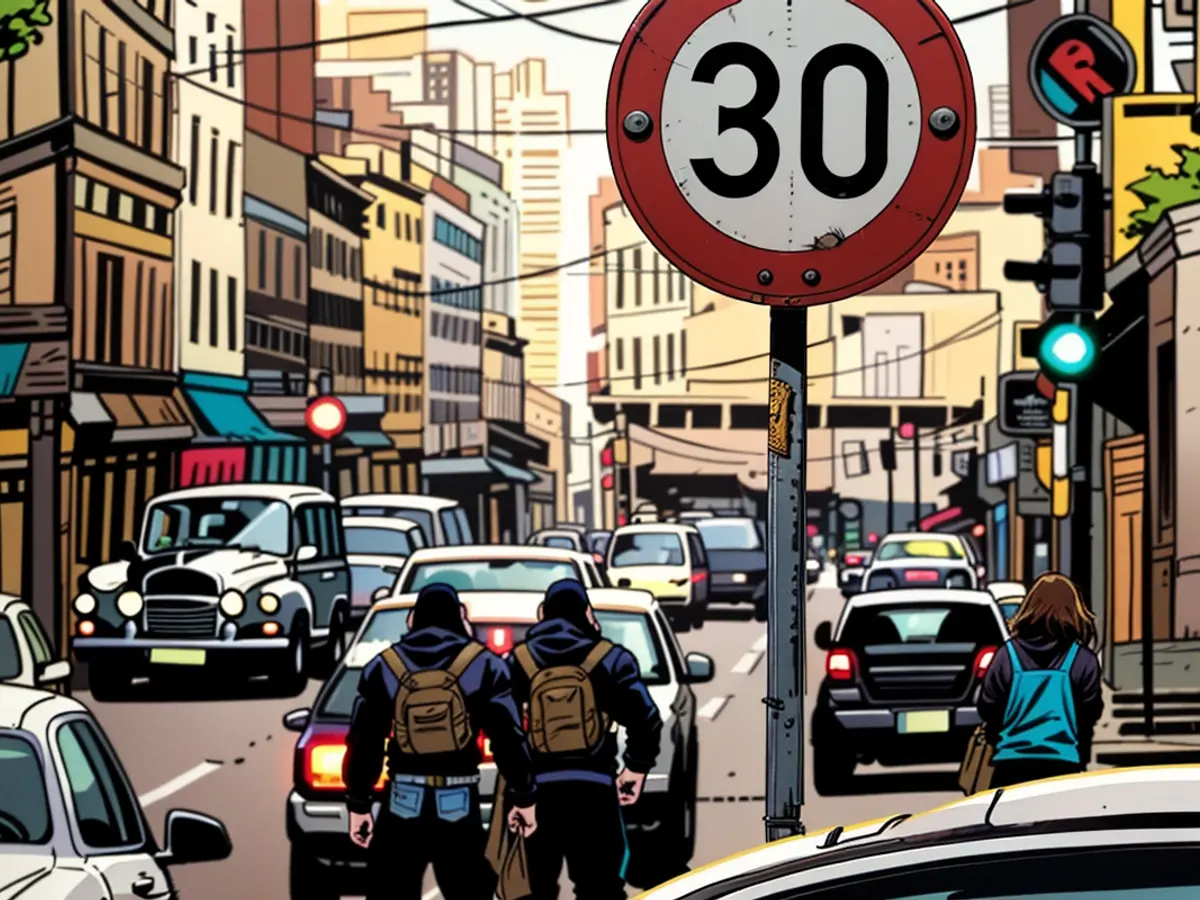Road Traffic Law - Hessian communes welcome relaxation for Tempo-30 zones
Hessian Municipalities welcome the reform of traffic law with more room for maneuver, particularly in the designation of Tempo-30 zones. However, cities and municipalities have further wishes, as a dpa survey revealed. The reform is positive but not sufficient, stated Michael Hofmeister from the Hessian City Council. He referred to the long-standing demand of the Association, to take one more step in internal speed limit regulations and to leave the decision to the municipalities about when and where which Tempo is ordered.
Tempo 30 to be possible on approach roads
The Bundesrat recently passed new regulations in traffic law, according to which bus lanes, cycle lanes, and Tempo-30 zones can be set up more easily on site. Tempo-30 zones can no longer only be designated in side streets, but also on approach roads. Concretely, it concerns streets near playgrounds. At schools, it should not only be possible directly in front of them, but also on heavily frequented school roads. Gaps between two Tempo-30 zones should be able to be closed more flexibly, so that traffic flows more easily. Currently, it is possible up to 300 meters - in the future, it can be up to 500 meters.
Associations expect intensive use of new spaces
"We assume that the municipalities will feel an improvement over the current narrow legal framework and will use the new action spaces," commented Hofmeister. Martin Grobba from the Hessian City and Town Council also welcomed the reform. However, he pointed out that it is first necessary to wait and see how concretely the legislative amendment will affect the Road Traffic Ordinance, which still needs to be adapted accordingly. "We assume that our members in the rural areas will mainly use the possibility of extended Tempo 30 zone designation and pedestrian crossings, if this is implemented," he estimated.
Municipalities are waiting for implementation in the Road Traffic Ordinance
Positive feedback comes from Marburg: "That's an important first step," said a city spokeswoman. The municipality has joined the alliance "Lively Cities and Communities," which has been demanding more decision-making leeway for a long time. The Marburg spokeswoman also referred to the upcoming implementation of the reformed traffic law in the Road Traffic Ordinance. "Only there will the new spaces and regulations be clarified in more detail."
Darmstadt hopes for simplified planning
Darmstadt is also part of the alliance "Lively Cities and Communities." The reform is a significant step towards sustainable and future-oriented traffic in cities, said a spokesman. Currently, there are no concrete plans in Darmstadt that are based on the new reform. However, improving air quality has been a priority for years. "With the reform, the city of Darmstadt hopes for fewer hurdles and simpler planning and ultimately implementation processes for a livable and environmentally friendly city - of course always taking traffic safety into account."
The reform is fundamentally positively assessed by Wiesbaden, said a spokeswoman. She gives the municipalities more room for maneuver to react to different requirements on site. "Concrete examples will certainly emerge in practice and will then also be implemented accordingly," she explained.
Kassel: "For concrete proposals still too early."
Kassel's City Council Member Simone Fedderke named the reform a "step in the right direction" but not a major leap. The new rules would bring more security and flexibility. "Currently, we in Kassel are looking at what is possible." A spokesperson from the city of Gießen added that their commune had collectively desired more shaping freedoms. However, there are things to be welcomed, such as the possibility of creating more Tempo 30 zones on school paths and playgrounds, and the relaxed requirements for zebra crossings. "However, it is still too early to make specific proposals about what can be implemented," she explained.
The Hessian City Council, representing various municipalities, applauds the Federal Council for expansion of Tempo-30 zones flexibility, but advocates for more control in internal speed limit regulations. With the amended legislation, Darmstadt expects simplified planning towards creating a sustainable and livable city. Despite the positive assessment, Kassel remains cautious, awaiting concrete proposals based on the new reform.








